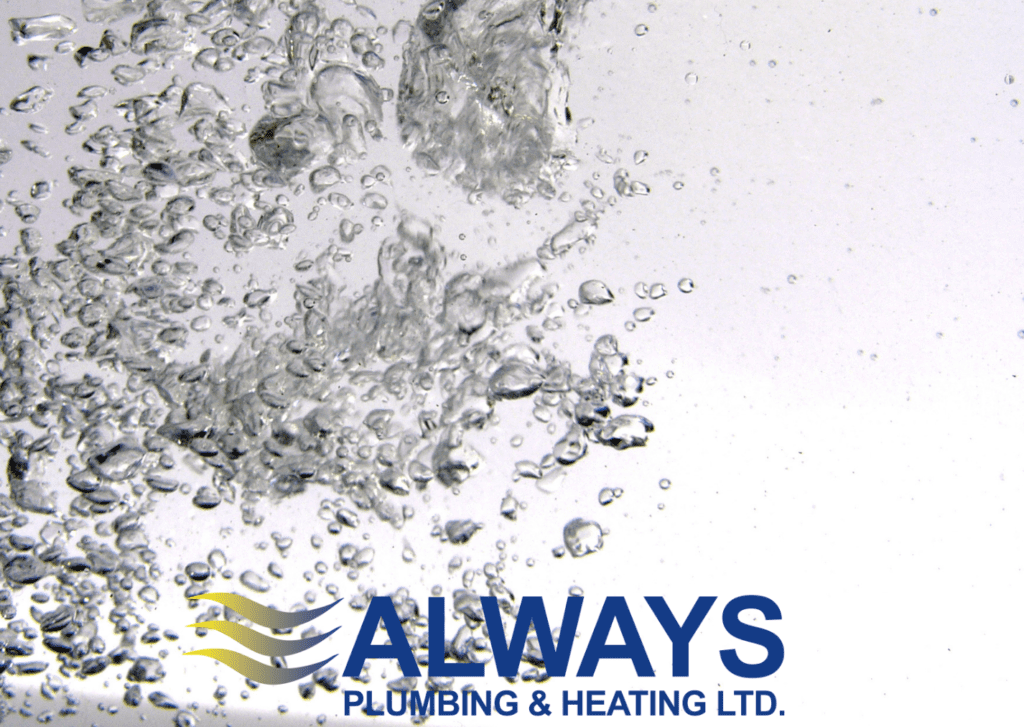The North Saskatchewan River supplies the Edmonton area with some of the best water in the world, but the river water is considered “moderately hard, about 165 milligrams of calcium carbonate per litre on average” (Epcor). Hard water contains excessive amounts of certain dissolved minerals, such as calcium and magnesium. While hard water isn’t dangerous to consume, it can create other problems. You may be beginning to notice the consequences of excessive minerals in the water supply. Common signs of hard water include spotted dishes, film on shower doors/curtains, dingy-looking cloths, mineral stains, and reduced water flow. You don’t necessarily need to test your water supply to know if you have hard water or not. There are many signs of hard water in your home that you can look out for.
How To Tell If Your Home Needs A Water Softener
1. Mineral Deposits
One common sign of hard water is sediment rings around your plumbing fixtures and drains. The water supply around Edmonton is known for causing scale buildup. Scale build-up is unsightly, damaging to fixtures, and can make washing more difficult including water restriction and poor water pressure. If you are using a hard water supply for your humidification, you might also notice scale buildup around your humidifier on your furnace as well as mineral deposits on your furniture.
2. Damage to Water Heater and Other Appliances
Hard water definitely increases the costs and lowers the lifespans associated with all of your water-using appliances. Raising the temperature of hard water contributes to the buildup of calcium and magnesium minerals. Excessive water hardness can cause limescale on your water tank wall, which can lead to overheating. Additionally, mineral deposits can build up in your pipes and appliances, leading to leaks and damaged appliances.
3. Skin and Hair
The harder the water the harder it is to form a lather for sudsy, effective cleaning. If it is hard to lather and your soaps aren’t effective, you probably have hard water. Hard water plus soap can leave a soapy film behind. The soap scum leaves hair and skin feeling itchy and looking dull. In addition to clogging pores and drying out skin and hair, hard water can also worsen skin conditions and hair loss. Soft water helps with rinsing, unclogging pores, and moisturizing skin and hair.
4. Drain and Fixture Clogs
Over time, the buildup of minerals and soap scum in your plumbing system will lead to restricted water flow and pressure. Eventually, entire drains, faucets, and showerheads can become clogged with these heavy metals and require replacement.
5. Foul-Tasting Water
For the best-tasting water, you want water that is neither too hard nor too soft. Water that is too hard can taste like chalk or minerals. Water that is too soft may have a flat, bad taste. Speak with a professional about maintaining the right soft/hard balance. This will make your water look and taste a lot better.
Water softeners can remove the minerals that cause these multiple problems throughout your home’s plumbing system. If you have bad-tasting, cloudy, sulfurous, or corrosive water, you can attach the necessary filtration technology to the water softener. This water filter attachment can be installed to the main supply line or under a sink for point-of-use filtration.
6. Damaged Clothes
Hard water can make your clothes feel stiff, rough and scratchy. Similar to dish soap and body wash, hard water makes it difficult for soap to work up a lather. The soapy film can prevent the removal of dirt, creating a loss of color and brightness. Hard water shortens the lifespan of your clothing. As a result of hard water, soap scum can deposit on drains, fixtures, dishes, showers, clothes, hair and skin. This causes numerous problems, especially in the winter time.
How Do Water Softeners Work?
Basically, a water softener releases sodium (salt) ions to help counteract the mineral ions that naturally occur in the water supply. By substituting calcium, magnesium, or other hard minerals with sodium, you can eliminate your hard water problems. Water softeners are often used as a pre-treatment for other water filtration and purification methods, such as a charcoal or carbon-based water filter.
Contact Always Plumbing & Heating to determine the right water softener and filtration system for your needs

